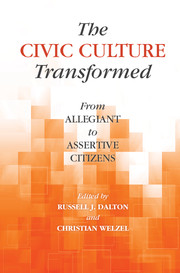Book contents
- Frontmatter
- Dedication
- Contents
- List of Figures
- List of Tables
- Contributors
- Foreword
- Preface and Acknowledgments
- 1 Political Culture and Value Change
- Part A Changing Values
- 2 Value Change over a Third of a Century
- 3 The Decline of Deference Revisited
- 4 Enlightening People
- Part B Changing Images of Government
- Part C The Impact of Cultural Change
- References
- Index
3 - The Decline of Deference Revisited
Evidence after Twenty-Five Years
Published online by Cambridge University Press: 05 January 2015
- Frontmatter
- Dedication
- Contents
- List of Figures
- List of Tables
- Contributors
- Foreword
- Preface and Acknowledgments
- 1 Political Culture and Value Change
- Part A Changing Values
- 2 Value Change over a Third of a Century
- 3 The Decline of Deference Revisited
- 4 Enlightening People
- Part B Changing Images of Government
- Part C The Impact of Cultural Change
- References
- Index
Summary
The Decline of Deference (Nevitte 1996) aimed to build a theoretical bridge linking authority orientations in “the family,” the economy, and politics. That project began with the premise that authority orientations are profoundly political and that they permeate primary relations, the economy, and the polity. The theoretical approach leveraged two lines of theorizing – one coming from political socialization theory and the other primarily from the insights of Eckstein (1966, 1969), Eckstein and Gurr (1975), and Pateman (1970). Combining those two theoretical traditions produced a number of empirical expectations, and those conjectures were empirically tested with data from the first and second waves of the World Values Survey (WVS).
The starting premise of The Decline of Deference was that understanding orientations toward authority reveals a great deal about how democracies work. These outlooks are fundamental to legitimacy and to the stability and effectiveness of collective life. Eckstein and Gurr (1975,361) captured the central issue succinctly: “The traits of authority that members of social units think of as most important,” they argued, “are those that determine how and whether members comply, cooperate, resist or work for transformation.”
Nevitte’s (1996) earlier empirical investigation probed several lines of inquiry. First, the study provided empirical support for the contention that authority orientations are connected across different domains. Second, the evidence showed that authority orientations became less deferential in the family, the workplace, and the polity between 1981 and 1990. The trajectories of change operated in the same direction in all twelve advanced industrial states, and in each case, those shifts were systematically related to structural markers, such as levels of education, suggesting that broad processes of social modernization were at work (Inglehart 1990). Third, the study explored whether these shifts were linked to changing patterns of political behavior.
- Type
- Chapter
- Information
- The Civic Culture TransformedFrom Allegiant to Assertive Citizens, pp. 35 - 58Publisher: Cambridge University PressPrint publication year: 2014
- 5
- Cited by

